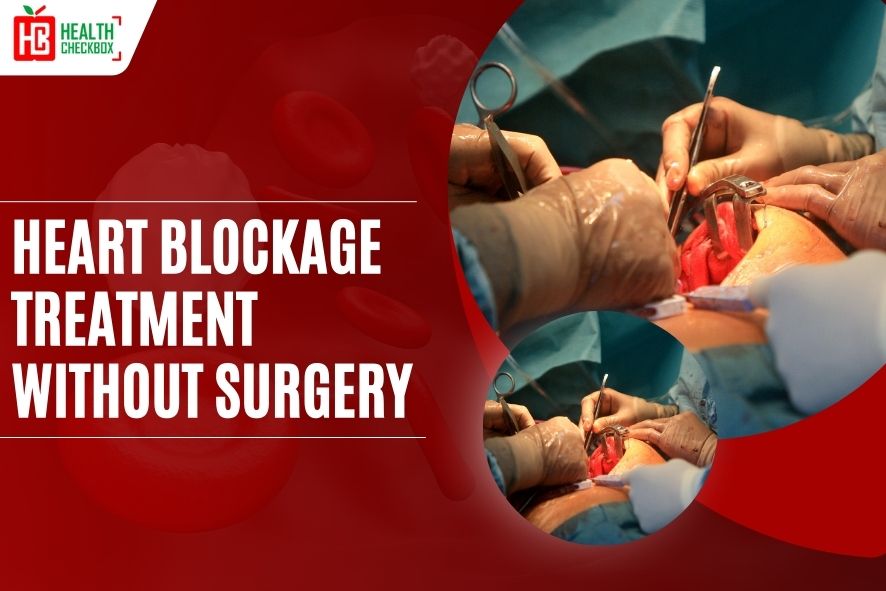Heart blockage occurs when the heart beats too slowly, i.e., an abnormal beating of the heart. Electrical impulses make the heart contract. A heart block occurs when an issue affects the flow of the heartbeat signal. The heartbeat signal travels from the upper chamber (atria) to the lower chamber (ventricle) of your heart. Rarely or never does this signal come through. As a consequence, your heart either misses beats or beats at a slower pace. In this blog, we will analyze the different ways of heart blockage treatment without surgery.
Doctors also refer to heart blockage as coronary artery disease (CAD) or coronary heart disease (CHD). When the coronary artery, which transfers blood to the heart, narrows, it leads to various symptoms. At certain times, heart attack or heart failure can also occur.
What is Heart Blockage?
A gradual accumulation of plaque or fatty deposits in the arteries leads to heart blockage. This deposit gradually hardens. And the arteries, narrow or constrict, get hardened. It reduces the flow of blood to the heart. Symptoms can be felt that include:
- Chest pain,
- Tiredness, and
- Shortness of breath.
Is Heart Blockage Treatment possible Without Surgery?
Unblocking the blocked or clogged arteries can be a challenge. Modern and latest techniques ensure the timely treatment of heart blockage. Angioplasty surgery is carried out to determine where the block persists.
Changes in lifestyle habits is the most efficient way to reduce heart blocks. A balanced diet with plenty of water intake helps maintain the various body functions.
The non-surgical procedures for removing heart blockage include:
A Healthy and Balanced Diet
Go for lifestyle changes.
- Increase the consumption of fruits, vegetables, and whole grains. Consume a balanced diet low in saturated and trans fats.
- Avoid eating processed foods, street food. All these are rich in unhealthy oil, have more sugar content. Consuming fast food on a regular basis makes one obese, increasing the risk for heart attacks.
- Take foods high in antioxidants. Omega-3 fatty acids are present in fish and nuts. Fiber intake may assist in decreasing plaque accumulation.
Avoid Tobacco Consumption and Alcohol Intake
Smoking is one of the leading causes of cancer worldwide.
- Chemicals that are present in tobacco pose a grave threat to heart and blood vessels. A buildup of plaque is likely to occur and blood clotting may also take place.
- Drinking too much alcohol is not good for the body. An increase in the fat content in the liver can occur in such a case and high blood pressure, liver disease and other ill-healths can occur.
Do Regular Physical Exercises
Exercising for 30 minutes a day keeps the body fresh and healthy.
- Consistent physical exercises like walking and cycling keep the body parts in motion. And improve blood circulation.
- Yoga keeps the body in shape and reduces mental tension.
- Sustain a healthy body weight.
Take Medicine
Medication is an effective treatment for many heart diseases. It includes high blood pressure and atherosclerosis treatment, or the hardening of the arteries. Besides, thrombolytic drugs are taken to break up the blood clot.
- Drugs that help to lower cholesterol. Examples include, Atorvastatin, Rosuvastatin.
- Blood thinners prevent blood clotting. Aspirin is an example.
Natural Cure and Herbal Supplements
Intake of certain herbs and supplements benefit and improve artery condition. It decreases plaque buildup, lowers cholesterol level, and improves the blood flow.
Examples include, garlic, turmeric, ginger, green tea, and coenzyme Q10 (CoQ10), which are rich in antioxidant properties.
Balloon Angioplasty
Angioplasty is one of the effective methods for treatment of clogged coronary arteries without surgery. A cardiologist threads a balloon-tipped catheter to pass to the location of the restricted or blocked artery. He or she subsequently blows the balloon to free the passage. Doctors frequently perform angioplasty and vascular stenting together. The medical team places a small tube of wire mesh, known as a stent, into your freshly opened artery during this procedure. Stents are a long-term medical device that help the artery to remain open and free from any obstacle.
Electrophysiology
A pacemaker inserted into your heart is another way to help palliate heart block. Surgeons surgically implant most such devices under the skin of the chest. Doctors consider implanting a pacemaker to be a minimally invasive surgical procedure. They usually administer local anesthesia.
Your cardiologist makes a tiny cut in your chest wall, that is directly below your collarbone.
What are the Causes for Heart Blockage?
Plaque or buildup of fatty deposits is the main cause of this condition. The artery walls as a result narrow and gradually stiffen.
Some of the factors that lead to heart blockage treatment include:
- A high cholesterol,
- An increased blood pressure,
- Lifestyle habits such as smoking, drinking,
- No physical activity,
- Family history,
- Obesity,
- Diabetes.
What Are The Symptoms Of Heart Blockage?
Patients with second or third-degree heart blockage may experience:
- Angina or chest pain,
- Fatigue,
- Shortness of breath,
- Heart attack.
What Are The Risk Factors Of Heart Blockage?
Risk factors for this ill-health include:
- High blood pressure or hypertension,
- High level of cholesterol,
- Diabetes,
- Smoking,
- Obesity,
- A family history of heart problems,
- Inactive lifestyle.
Conclusion
It is not necessary that heart blockage may need surgery. Different non-surgical procedures can effectively control this ill-health. Sticking to a healthy and balanced diet, avoiding the use of tobacco and alcohol, and advanced therapies–all of these can ensure you a healthy heart.

